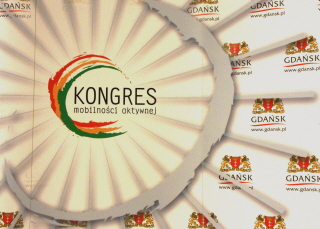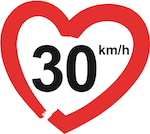Polish Cities wish to have harmonised 20 mph speed limits
on Sep 23, 2013

Good news! Thirteen Polish mayors and representatives of Polish municipalities have signed a declaration of support for our European Citizens´ Initiative. This important ceremony took place during the 4th Congress for Active Mobility on Gdansk, 11.-13.9.2013. Among the signing cities was Gdansk, which is one of the major Polish cities, and Maciej Lisicki, mayor of Gdanks, was the very first person who signed this very helpful declaration. All organisers of the European Citizens´ Initiative highly welcome the good news from Poland.
“If we are able to establish more alliances like this one – the civil society co-operating with the local communities – we will finally be able to convince the EU to take action”, says Heike Aghte, speaker of the citizens committee. “The EU commission is the responsible body to start the legislation process for harmonised speed limits for the whole European Union. This would then mean mean that every person knows them by heart wherever they are travelling. This is an essentual pre-condition for more road safety.”
The Polish mayors have expressed the same opinion. Even more, they specified additional benefits in their document, like the fact that 30 km/h 30 km/h default speed limit for residential/urban areas is an inexpensive way to improve safety, cut pollution and encourage smarter travel choices with a higher amount of pedestriany and cyclists
- They underline that Polish municipalities are hospitable communities and that is therefore important for them that the major rules for a safe travelling are clear for everyone, inhabitants as well as all guests and tourists. An increased harmonisation in road traffic regulation across the European Union will support their efforts.
- A harmonised legislative framework will make it far more cost effective for communities to change to a more sustainable mobility, the mayors say. It can be recognised that many cities are moving from the old standard with 50 / 60 km/h to one where an increasing number of streets and zones will have 30 km/h zones. This imposes huge costs on local authorities for signage where they want to create a consistent speed limit of 30 km/h. These expenses can be saved with a default of 30 km/h.
- The mayors finally stress the fact that local authorities must have the final decision to set other speed limits on their roads and implement equivalent alternatives.
So, this is exactly what the initiative “30 km/h – making streets liveable!” is proposing as well!
See the complete declaration text.
See the website of the 4th Congress for Active Mobility.
You can donate here and help us continuing our campaign.
